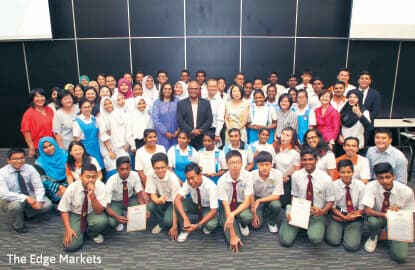
PETALING JAYA: Four years ago, The Edge Education Foundation launched a free tuition-cum-mentoring programme in two schools in Kuala Lumpur and on Wednesday, about 40 students “graduated” from the programme.
In a simple ceremony at Taylor’s University Lakeside Campus, the students from SMK Convent Sentul and SMK (L) Methodist Sentul received their certificates of participation in the Programme for After Class Enrichment (Pace) from Taylor’s University deputy vice chancellor Prof Dr Pradeep Nair.
Taylor’s University was one of the partners for Pace, which was conducted at the two Sentul schools from 2013 to 2015. Two other partners were EY and KLK Oleo. The programme was sponsored by Kuala Lumpur Kepong Bhd.
Pace targeted academically challenged students in lower secondary school who came from lower-income families. The same group of students joined the programme from Form One to Form Three. Students received academic support in the form of tuition in Bahasa Malaysia, English and Mathematics from teachers and external tutors. Taylor’s Business School students participated in the programme as assistant tutors for English and Mathematics.
Social support was provided by mentors from EY and KLK Oleo, who also guided Pace students at the two schools in implementing a small business project. Students used the money earned from the two projects to open their own savings accounts.
“Among academically challenged students from low-income homes, the inability to cope in higher forms as subjects get more difficult, as well as economic pressures on the family, can cause them to drop out of school,” said Dorothy Teoh, chief executive officer of The Edge Education Foundation.
“So the objectives of Pace were to encourage students to stay in school instead of dropping out, and to do better. It also aimed at equipping them with literacy and numeracy skills which will stand them in good stead beyond school,” she added.
Teoh said that based on feedback from the two schools, only one of the approximately 40 students in the programme had left school. The remaining Pace students are currently in Form Four, and about 20% of the students had moved up to a better class, she noted.
At the event on Wednesday, Pradeep told the Pace students that while they needed to pass examinations, they would also need to be able to communicate well in both English and Bahasa Malaysia, learn how to collaborate and work in teams, and be innovative in solving problems in order to get jobs in the future. He encouraged the Pace students to work at honing these skills.
Over the three years, more than 400 Taylor’s Business School students participated in the programme. “I believe by being part of this programme, Taylor’s students really made a positive impact on their mentees and hopefully, inspired them to have a better future,” said Pradeep.
Speaking on behalf of EY volunteers who worked with Pace students, Lee Soo Fern, Malaysia Talent Leader at EY, said it was very heart-warming to see how far the Pace students had come.
“Over the course of the three-year programme, they have become more confident and articulate, and have shown greater interest in learning and acquiring skills. We are so proud of all of them. Their achievements are particularly significant and meaningful, given where they started from in the first year of the programme. We hope they will continue to excel and thrive in the future,” she said.
Daniel Cheong, business manager for Biodiesel & Methyl Esters at KLK Oleo, agreed with Lee. He said it was heartening to see the students’ improvement in terms of attitude, their well-being and academic performance.
“It is still a long road for the students. Nevertheless, as the foundation is laid, we hope they stay motivated and continue to improve in their studies,” he added.
Education is one of the pillars of KLK Care, which represents the entire Kuala Lumpur Kepong Bhd group’s corporate responsibility commitment.